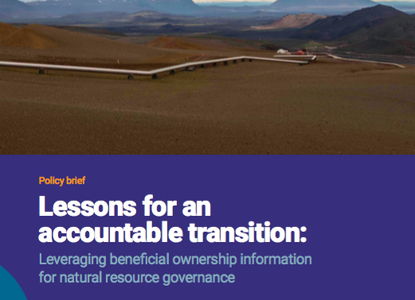Looking back, moving forward: Taking action for accountability in natural resource governance

The extractive sector’s experience highlights that increasing investment in accountability mechanisms helps prevent and detect corruption and fraud. As demand for minerals needed for energy transition technologies grows, these risks may become more pronounced. Significant progress is needed to ensure that extractive companies are managed openly and responsibly. Effective collection, publication and use of beneficial ownership information are crucial to strengthen safeguards in the governance of natural resources.
Global and local stakeholders are keen on ensuring that the anticipated boom in mineral demand translates into accountable mining operations, benefitting the citizens of resource-rich countries. Limited access to information about the true beneficiaries of companies involved in the extractive sector hinders the identification of corruption and the prevention of criminal activities. This lack of transparency often accompanies high commodity demand and prevents the equitable sharing of natural resources.
To address this, the EITI and Open Ownership launched the Opening Extractives programme in 2021, aiming to increase the availability of beneficial ownership information and promote its use. Both organisations believe that collecting, publishing and using this data will help countries identify corruption risks and illicit activities, strengthening governance safeguards. In less than three years, there has been a significant shift in the collection of beneficial ownership information and its perceived value. Recent interactions with stakeholders in Zambia show a demand for information on beneficial owners and an understanding of its importance in ensuring accountability and combatting corruption.
A new briefing, produced for the Opening Extractives programme offers actionable lessons for policymakers, companies and public agencies to improve the availability and use of beneficial ownership data. Examples from Armenia to Zambia illustrate how beneficial ownership information supports integrity and accountability throughout the extractives value chain.
Key takeaways
Enabling data use across the value chain
Government actors implement beneficial ownership transparency to achieve specific policy aims.Effective implementation requires comprehensive legislative frameworks and technological systems that make data accessible and usable. Data should be interoperable, allowing it to connect across beneficial ownership datasets and with other data types. Engaging data users is crucial to understanding their questions and needs regarding beneficial ownership information. When governments provide this data, agencies and civil society can use it to detect conflicts of interest, fraud and other anomalies, ensuring compliance with regulations.
For instance, in Ghana, beneficial ownership information to revoke wrongly granted mining rights. Ghana’s Companies Act prohibits individuals with criminal convictions from doing business in Ghana. In 2020, the Minister for Mines instructed the Minerals Commission not to renew a license for a company whose directors had criminal convictions, discovered through the beneficial ownership register.
Reducing risks and supporting revenue generation
Beneficial ownership information helps prevent and detect corruption in commodity trading and supports private companies and state-owned enterprises (SOEs) in reducing risks during subcontracting and due diligence. Legislation should mandate disclosure from a wide range of corporate entities, including SOEs. Transparency over their ownership and control is vital for well-functioning economies in resource-rich countries.
For example, Nigeria’s national oil company’s crude oil-for-product swap deals in the early 2010s resulted in significant revenue losses, which could have been used for social and economic infrastructure. Policy Alert’s investigation revealed the complexity of these deals, involving multiple corporate entities and highlighting the need for transparency to prevent revenue loss.
Standardising beneficial ownership information
Standardising beneficial ownership information enhances interoperability and usability, facilitating the combination of data from different jurisdictions and with other types of data. This is essential to expose fraud and corruption schemes. Nigeria’s Joining the Dots project compiles information on politically exposed persons (PEPs) who are beneficial owners of companies holding mining, oil and gas licenses This project has advanced transparency and accountability in Nigeria’s extractive sector by making data easier to use for public oversight, though challenges related to data availability and reliability remain.
Improving access to information for civil society
Media and civil society organisations (CSOs) play a critical role exposing the misuse of anonymous corporate vehicles and providing public oversight. Ensuring their access to usable beneficial ownership data is crucial. In Argentina, CSOs highlighted the lack of accessible ownership information in the mining sector, making it difficult to ensure public oversight. With support from the Opening Extractives programme, investigations on the governance of lithium exploitation revealed the complexity of ownership networks and the challenges in identifying ultimate beneficial owners without beneficial ownership registers.
In Armenia, journalists used beneficial ownership information to raise red flags and hold corporate and government actors to account. They discovered that some companies with mining permits submitted incorrect or incomplete declarations, or none at all. Such investigations are vital for ensuring compliance with licensing policies and procedures.
Moving forward
Multi-stakeholder collaboration is essential for promoting responsible corporate practices and addressing criminality, fraud and corruption in strategic sectors. Open Ownership and EITI continue to work with governments, companies and civil society through the Opening Extractives programme to improve access, collection and use of beneficial ownership information The lessons from the extractive sector are particularly relevant as the energy transition progresses, increasing demand for transition minerals. A collaborative approach to making beneficial ownership data accessible and usable is crucial for accountable natural resource management. The examples in this brief underscore the importance of accelerating global progress in this area.
